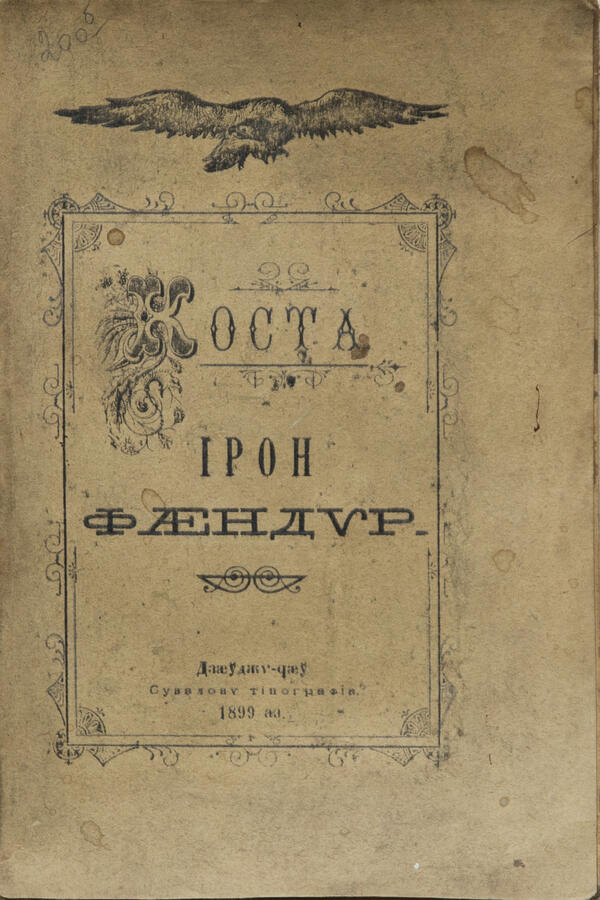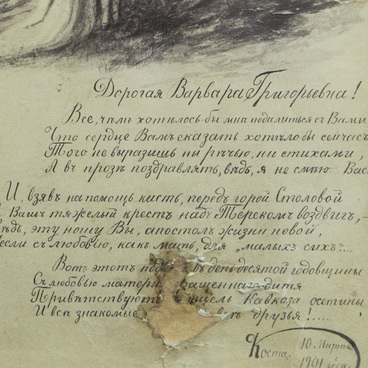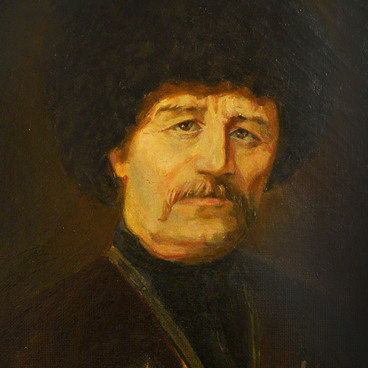In 1898, Kosta Khetagurov gave his friend and personal attorney, Geogriy (Gappo) Baev, his collection ‘Ossetian Lira’ (‘Iron faendyr’) in two notebooks for later publication. The manuscript was comprised of 50 poems. Baev sent the notebooks from Vladikavkaz to the Caucasian Censorship Committee in Tiflis with an accompanying letter. However, nobody in the committee spoke Ossetian.
Therefore, on September 12th, 1898, the chairman of the committee sent the manuscript to the trustee of the Caucasian school district, Kirill Yanovsky. He also entrusted the review of the collection to Christopher (Pora) Dzhioev. After receiving the manuscript and reading its poems, Dzhioev immediately realized that it was a unique cultural phenomenon. These were the first works of great artistic value in Ossetian literature.
Dzhioev appreciated both Khetagurov’s voice and style, so he took “Ossetian Lira” under his care. He decided to publish the collection at any cost and stay as close as possible to the author’s original text.
Dzhioev wrote a detailed report-review of the manuscript, analyzing each poem separately and in-detail, from the view of political acceptability. On October 25, 1898, he sent the report to the Yanovskiy, the trustee of the Caucasian school district, in which he wrote: ‘I’ve carefully reviewed this handwritten collection of poems, called ‘Ironfondyr’, that has been sent to me. A part of the poems included in this collection are literal translations of of some Russian poems. Here are their titles: ‘Dyuuæ halons’ (‘Two Crows’); ‘Uasæg’ (‘Cockerel’); ‘TS’iu æmærællættæ’ (“Captured bird”); “halon æmæ ruvas” (“The Crow and the Fox”); “Khaztæ” (“Geese”); and “Biræg æmæ hrihupp” (“The Wolf and the Crane”). We consider it quite unnecessary to present our personal opinions on these poems. As for the original poems… only the poem “Azar” (“Sing”) seems somewhat questionable to us in terms of censorship… "
Dzhioev couldn’t refuse to sign off on the entire collection just because of one poem. He made a compromise by singling out “Sing”, so that Khetagurov’s book could be published. Later, Dzhioev wrote to Baev: ‘I wanted to gain the trust of the trustee and the Censorship Committee, not for myself, of course, but so that in the future, Ossetian manuscripts would be sent to me’.
As the result of Christopher Dzhioev’s review, the Caucasian Censorship Committee approved the publication of the “Ossetian Lira” collection and gave permission to Vladikavkaz publisher Georgiy Baev to publish the book.
Therefore, on September 12th, 1898, the chairman of the committee sent the manuscript to the trustee of the Caucasian school district, Kirill Yanovsky. He also entrusted the review of the collection to Christopher (Pora) Dzhioev. After receiving the manuscript and reading its poems, Dzhioev immediately realized that it was a unique cultural phenomenon. These were the first works of great artistic value in Ossetian literature.
Dzhioev appreciated both Khetagurov’s voice and style, so he took “Ossetian Lira” under his care. He decided to publish the collection at any cost and stay as close as possible to the author’s original text.
Dzhioev wrote a detailed report-review of the manuscript, analyzing each poem separately and in-detail, from the view of political acceptability. On October 25, 1898, he sent the report to the Yanovskiy, the trustee of the Caucasian school district, in which he wrote: ‘I’ve carefully reviewed this handwritten collection of poems, called ‘Ironfondyr’, that has been sent to me. A part of the poems included in this collection are literal translations of of some Russian poems. Here are their titles: ‘Dyuuæ halons’ (‘Two Crows’); ‘Uasæg’ (‘Cockerel’); ‘TS’iu æmærællættæ’ (“Captured bird”); “halon æmæ ruvas” (“The Crow and the Fox”); “Khaztæ” (“Geese”); and “Biræg æmæ hrihupp” (“The Wolf and the Crane”). We consider it quite unnecessary to present our personal opinions on these poems. As for the original poems… only the poem “Azar” (“Sing”) seems somewhat questionable to us in terms of censorship… "
Dzhioev couldn’t refuse to sign off on the entire collection just because of one poem. He made a compromise by singling out “Sing”, so that Khetagurov’s book could be published. Later, Dzhioev wrote to Baev: ‘I wanted to gain the trust of the trustee and the Censorship Committee, not for myself, of course, but so that in the future, Ossetian manuscripts would be sent to me’.
As the result of Christopher Dzhioev’s review, the Caucasian Censorship Committee approved the publication of the “Ossetian Lira” collection and gave permission to Vladikavkaz publisher Georgiy Baev to publish the book.



